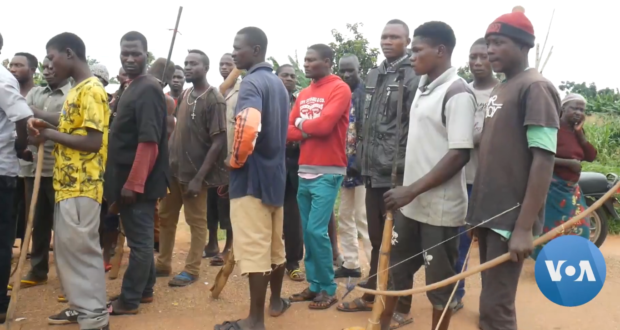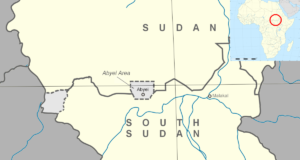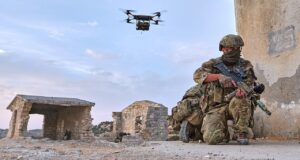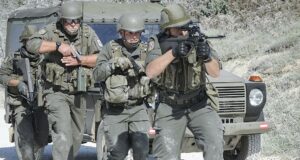15 February, 2022
By Mette Kaalby Vestergaard – Research Assistant
Nigeria’s state of emergency
One year ago, in January 2021 President Muhammadu Buhari expressed that Nigeria was in a state of emergency. This was, and is still, true due to the serious security threats in the country. In 2023 there will be general elections in Nigeria and the current President continuously states that security in the country will be established before handing over power. Already now a year before the elections, it can be discussed whether security, or lack there off, can affect the very happening of such elections. It is as such the opinion of some, that the elections will be harder than the previous ones in the country, because of insecurity in almost every region. On January 20, it was expressed that the 2023 general elections in the southwest might not be possible due to security threats, specifically referring to the numbers of kidnappings. Moreover, the Independent National Electoral Commission (INEC) has been under attack in at least 6 different states, resulting in more than 25 offices being burnt down between February 2019 and May 2021. This can be seen as an act against the government and as such indicating a direct threat towards the very institutions responsible for the elections.
The pandemic starting in 2020 has led to larger unemployment and worsened the country’s economy. Because of the oil production holding a large share in Nigeria’s economic growth, the country was hard hit by declining oil prices over the past years. This has resulted in the argument that the country should attempt to cut down on its economic dependency on oil.
On top of the security situation, it will be hard for many voters to grasp whether politicians are taking advantage of the crisis to promote their own interest or if they will carry out the pledged plans if elected. While it is likely that most of the focus during the campaigns will concern political intrigues, it is important to note that what the president can offer the country in terms of security will also be a central factor in the following year. As such, it is critical to identify which topics are relevant for consideration besides economic planning, and as such what to look for in speeches and politics expressed by candidates to determine their prioritization.
Terrorism as an established long-term threat
The terrorist group Boko Haram, primarily dominating in the north-eastern state of Borno, without doubt poses one of the more severe security threats in Nigeria. Siding with them is also Islamic State in West Africa (ISWA). The threat of Islamic extremist groups in the north should be considered as posing a long-term risk to the country, due to a lack of ability to estimate their capacity. This is especially due to their possessing of arms and ammunition, as well as other military equipment. Since a government military campaign was initiated in 2015, the groups have primarily been working from hideouts. However, they have still been able to carry out large-scale attacks on civilians with mass casualties. Some of the operational method applied by groups in the Borno states have resulted in the state being separated from the rest of the nation. This is especially resulting from Boko Haram’s ability to control highways and carry out attacks, that disable both logistics and subsequently trade with external states. Resulting, it has isolated states in the North, especially with regards to trade and development.
Criminal gangs and kidnappings
Armed criminal gangs pose an enormous threat to the civilian population in Nigeria. Those living in the when northwestern parts of Nigeria do so under a high threat of kidnapping. The extent to which this factor affects security even amounts to the kidnappings being a part of the actual economy, as it has led to an increase in poverty and constitutes an actual business for criminals. On 5 January 2022 it was as a result decided that criminal gangs raging the north, could be classified as terrorists. The activities of Yan Bindiga and Yan Ta’adda (local expression for bandit and gunmen), do as such constitute acts of terror. The move is the result of a long period with pressure on Buhari to do more. One of the main factors facilitating violence across the country, is moreover the large-scale possession of small arms by non-state-actors.
While this is connected to all the threats set out in this piece, it especially enables groups to function as smaller militias with an economic agenda. Some of the criminal gangs and their internal conflicts, results from gold mining, especially in the Zamfara State. In this state, a huge part of the criminal activity is also related to arms smuggling across the border to Niger. Oil production in the South does additionally lead to violence, as smaller groups are trying to gain profit by taking share in the trade. However, the problem was considerably more severe prior to 2009, when an amnesty programme for participants was established.
Another problem, is of course piracy, which many connect with Nigeria’s coast towards the south. Often these are parts of larger networks with very good capabilities, making it hard for the government forces to combat them. Moreover, problems of coordination arise when operating in international waters. Altogether, this means that very complex political and structural measures are necessary to combat this threat.
A conflict of environmental resources
In the mid- and northern parts of the country violence related to conflicts between herders and farmers is a significant threat to security. While these confrontations have a long history of being described as ethnic conflicts between the Muslim Fulani herders and Christian farmers, many locals understand it as a conflict concerning environmental resources, land, and livestock. In 2019, the federal government issued a National Livestock Transformation Plan in an attempt to assist the solving of the crisis. Despite this, and due to poor leadership and expertise to carry out the plan, the conflict persists. Related to the conflict between herders and farmers, is an increased criminal activity amongst gangs that has led to further violence between civil groups, as their attacks have created a need for weapons for self-defense purposes. Furthermore, the possession of weapons and moreover the blaming from different sides of working with the gangs have created a spiral of violence. The latter has especially happened if groups have been forced into the areas usually possessed by criminals, for environmental causes. This have resulted in the population mixing up the groups and questioning their loyalty and as such increased tensions.
Separatists and voters
The security threat mostly present in the southeast is the Indigenous People of Biafra (IPOB). This group and their so-called Eastern Security Network (ESN) constitutes an anti-Fulani group seeking independence for the Igbo Ethnic group and has been declared a terrorist organization by the government, despite their large support from many inhabitants in the area. Leader Nnamdi Kanu is currently at trial in Abuja charged with acts of terrorism. This event and its outcome is likely to affect the 2023 elections, even though Buhari has expressed that a political solution is not possible and therefore a judge should determine the outcome. While this can first of all be seen as an attempt not to let his decision of carrying out the trial affect APC’s number of votes by people supportive of Kanu, it also means that the involvement and toleration for separatists groups going forward, will be affected by the outcome of this case.
Why they matter and how
All dynamics mentioned above are to a large extent national and in that sense local along with the fact that no region in Nigeria can be said to be free of instability or secure for the local population. What especially matters, is the multidimensional nature of the threats and how they are bound together. The candidates for the 2023 elections each carry their own background and interest with them. For security to increase after 2023 it is central that the country’s new leader is willing to include all aspects of society in a dialogue for improved security. This is especially the case concerning conflict between herders and farmers. An interesting point to look for will moreover be the suggestion that states should be able to have and operate within their own security agencies, to be better able to meet the different threats. This will likely enable a better differentiation in approach and related actions, depending on whether the interest of the perpetrator is economic or ideological.
A further perspective from which to analyze the new candidates is their take on the new terror legislation enhancing their capability to interfere when suspected activities are taking place. How this will matter, particularly considering the criminal gangs, is most critical in relation to the civil population and their rights. In more parts of the country distrust prevails towards the government, and violations of human and civil rights can increase this hostility. This leads to resistance against the government and in general a lower level of trust in public institutions, which increases the likelihood of young people finding it necessary to go down a criminal path. If the kidnappings, especially in the central and northern parts of the country, do moreover not come to an end, it can result in even more resistance and distrust towards the military. As a result this will not enable collaboration with civilians, for example in relation to intelligence gathering with the aim of combating insurgent groups.
Besides these points, it should be noted whether the candidates own interests and relations to Nigerian business shapes their priorities. Some of the security problems also create a need for alternatives, which might lead to businesses for the government. This could for example be shutdown of highways between states, that will lead to a need for alternative infrastructure. Hence, the very political prioritization of security issues can end up being done based on economic gain for the few.
Lastly, is the very central and obvious question; if the security challenges can prevent the physical election in 2023. Attacks have already proven that government facilities are targets, and if this risk continues to exist, it is also likely that events and places connected to the elections will be target for attacks, along with the population at the sites.
One year to go
For now, it will be interesting to look for the role of these security threats and how they will impact the elections. Hence there is both a political element but also potential security obstacles of a physical election. Moreover, it will also be significant for Nigeria, whether the different security threats in the states lead to a more united or more divided country. While this goes for the civil population, it is particularly also relevant to look for in terms of the state security resource allocation and organization between the federal level and the individual states within the country. Finally, President Buhari still has one year to implement new security measures – a possibility for action that will most likely be affected by the positioning of APC in the upcoming elections.
Image: armed separatists in southern Nigeria
 Human Security Centre Human Rights and International Security Research
Human Security Centre Human Rights and International Security Research




